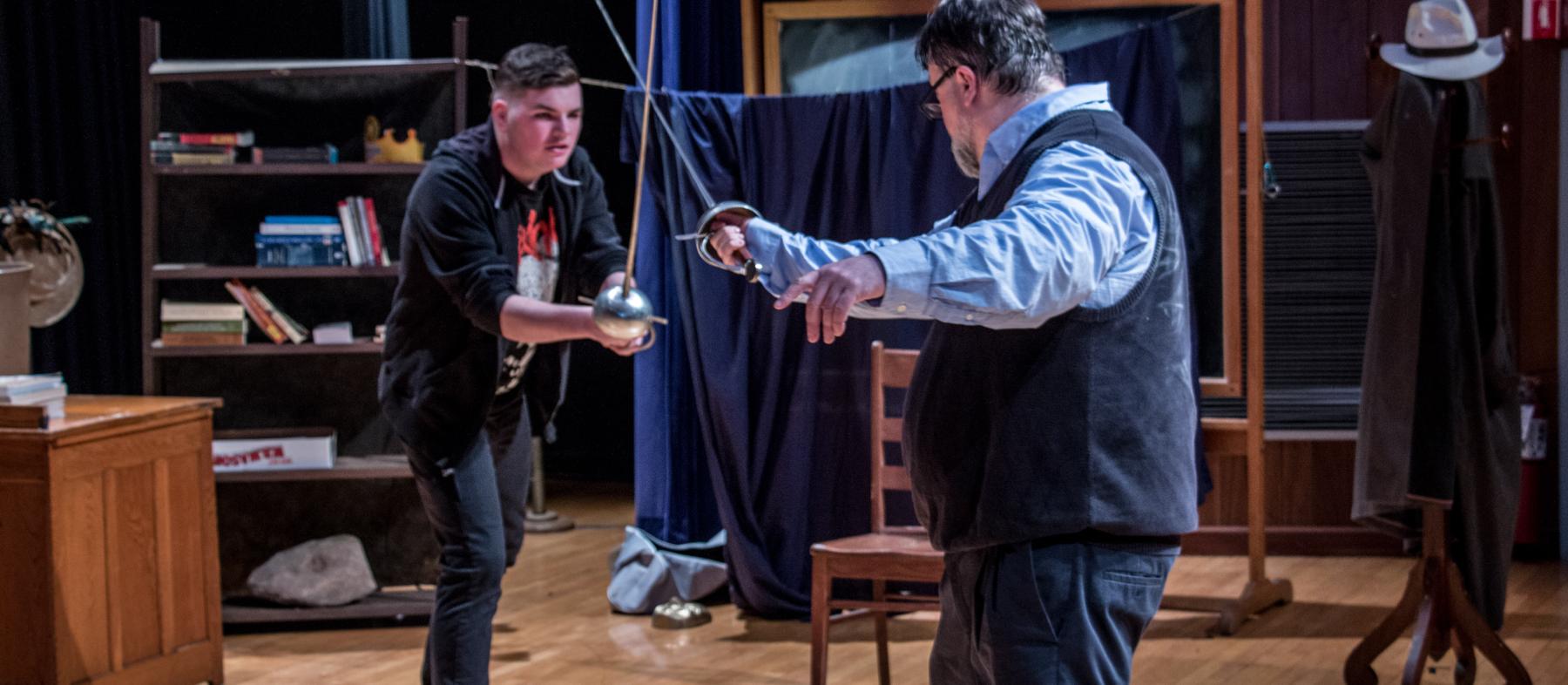Program Goals:
Theater at QCC serves the Liberal Arts by providing a rigorous aesthetic, intellectual, and practical opportunity to explore the frontiers of learning and the formation of collaborative communities. The primary mode of study is the practice of theater, involving theoretical, historical, aesthetic and technical elements. The QCC Liberal Arts - Theater Option program is comprehensive in nature, and is designed to maximize opportunities for training that would transfer to four-year institutions for students interested in theater arts, or provide students with enough knowledge to enter the visual or performing arts workforce.
Student Learning Outcomes:
Upon completion of the program, graduates will be able to:
- Obtain a fundamental understanding of the production process, including ticket sales, set design/construction, lights/sound, and marketing, front of house, props, costumes, and makeup/hair.
- Learn how to use their bodies as vessels for more complete and creative acting and character development; students will also learn tumbling, mask utilization, breathing techniques, and script analysis as it serves the physical life of the characters, as well as balance, physical/psychological extension, flexibility, stress/adaptive strategies, sensory acuity, and hand-to-hand combat.
- Learn the importance of breathing, alignment, dynamic tension, warm-up, range extension, pitch and stress work, resonance, vocal care and stamina, acting through the emotion, improving speech detail, International Phonetic Alphabet notation/pronunciation in varying contemporary and classical styles, and text analysis; students will study how “voice” can influence characterization and will also learn dialects.
- Gain familiarity with the art and practice of acting, both as an observer and a participant, including an introduction to the language, terms, and concepts of theater, as well as to the specific craft and technique work of the actor and the process by which actors work; students will learn to critically observe and evaluate theater performance: text and subtext, stage business, blocking, character analysis, analyzing a script - dramaturgy, beats of action, methods of acting - want/objective-obstacle-action-conclusion, auditioning skills, play reports, post 1930 full-length plays (non-musicals, one-acts, or ten-minute plays), urgency scene (no speaking), oral history, as well as other skills.
- Learn how to manage a production from rehearsal to performance to striking the production on closing night, including pre-show techniques and efficiencies, call times, sound and light cues, costume changes, front of house coordination, recording blocking, and managing backstage; students will also learn Actors Equity Association rules of stage management.
- Learn to develop artistic perception, creative expression, and aesthetic valuing of the writer’s Creative Intent, and develop the ability to connect and apply what is learned in drama to other art forms, subjects, and careers; students will continue to learn theater terminology for the stage, acting, directing, and technical aspects of production through the literary management of the text, will learn writing/acting/script analysis, and will use personally-inspired stories to create scenes and possibly one-act plays, as well as cultural implications, staging effects, and oral interpretation.
Admissions Process:
Admissions inquiries should be directed to admissions@qcc.mass.edu. Prospective students may apply to the program of their choice by following the enrollment steps at www.QCC.edu/enrollment-steps.
Program Admissions Requirements:
Students should note that some first semester courses carry minimum prerequisites. Refer to the program grid.
- High School Diploma or GED/HiSET.
CORI, SORI, Finger Printing & Drug Testing:
Criminal Offender Record Information (CORI) and Sex Offender Registry Information (SORI) checks are not required. Fingerprinting and drug testing are not required.
Additional Cost:
See the Program Fees page.
Technical Performance Standards:
See the Technical Performance Standards page. (Note: Not all programs have technical performance standards).
Credit for Prior Learning:
Credit for Prior Learning (CPL) allows students to use skills they already have towards a college degree or certificate. Work, life, volunteer and military experience may be translated into credit, allowing students to take fewer classes and earn their degree faster. CPL eliminates redundancies for students who have already earned credentials or mastered skills required for their program of study. Email experience@qcc.mass.edu for more information and eligibility.
Career Outlook:
Please consult the Massachusetts Career Information System at https://masscis.intocareers.org/ or the Occupational Outlook Handbook at www.bls.gov/ooh/ for specific occupational information. The CIP code for this program is 50.0507.
Transfer Articulations & Opportunities:
Prospective students may learn more about transfer articulation agreements at www.QCC.edu/agreements. More information regarding transfer opportunities is available at www.QCC.edu/transfer.

